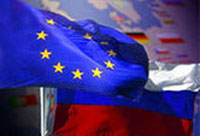Europe Wants To Put Pressure on Russia, Does Not Know How
Baroness Catherine Ashton said during her recent speech at the European Parliament that the EU had to put pressure on Moscow to make the Russian administration not mix economic and political issues in relations with neighboring states, particularly with Ukraine.

Catherine Ashton, the new EU foreign affairs chief, also said that she wanted to have strong relations and clear energy strategy with Russia. She set out concerns about Europe’s dependence on the Russian natural gas and said that the dependence may grow from 50 percent nowadays to 70 percent in the future.
Sandra Kalniete, Latvia’s deputy in the European Parliament, then said that the European Union would try to coordinate its joint policy which the EU virtually did not have with Russia before. The official said that the EU members would particularly discuss a number of key issues including the Russian energy transit via the countries of the former USSR.
Ukraine comes first when it goes about the transit of the Russian fuel to Europe. Baroness Ashton said that the EU would have to wait for the results of the presidential election in Ukraine before developing relations with the country.
"There are real concerns that we've got to address immediately after the elections. One is, what will [Ukraine's] relationship with Russia be [after the presidential election]. How do we support specifically the issues on which we're already working - judicial issues, and the rule of law? Where are we going in terms of moving forward to a trade agreement? Work has begun, but there is a huge amount of work and a huge amount of expectation about what Ukraine needs to do. So it's not that I don't have clear ideas of the areas that we need to discuss and to be able to go and do so quickly, but I think we just have to wait until the elections are over before we can do that," she said during public hearings in Brussels this week.
However, the matter does not come down to the election of the Ukrainian president only. The remarks that the Baroness made about Europe’s relations with Russia and Ukraine did not outline a thing about any type of strategy. At the same time, Ashton said that she would like to visit Moscow soon to “develop relations with Russia”.
On the one hand, she wants to put pressure on Russia, but on the other hand, she said that Europe needs to develop relations with Russia.
Dmitry Danilov, a scientist of politics with the Department for European Security of the Russian Academy of Sciences, said in an interview with Pravda.Ru that the current events in the EU-Russian relations reflect their competition on a variety of issues.
“It will be possible for Russia and the European Union to establish normal relations only after they acknowledge the fact of this competition. The energy industry is very indicative at this point. Russia is not interested in the diversification of fuel shipments, which the EU wants. Our views differ on a number of other issues, related to the energy industry.
“Russian officials told their European colleagues before that they support competition and would not be willing to add politics to a purely economic issue. It is Europe that makes this issue political claiming that Russia supposedly uses its fuel as a weapon against other countries.
“When Putin suggested Russia’s participation in Europe’s gas transporting networks, Brussels immediately said that there was a danger of Russia’s growing influence.
“Even if Russia used the energy weapon to accomplish its goals, there would be nothing terrible about it. Every country in the world uses its economic influence to achieve political goals.
“As for Europe’s attempt to put pressure on Russia, I do not think that they would be willing to do that. If it happens, Russia will respond with something like that too. Besides, the majority of European countries are not interested in such an initiative,” the expert said.
Sergey Balmasov
Pravda.Ru
Subscribe to Pravda.Ru Telegram channel, Facebook, RSS!





